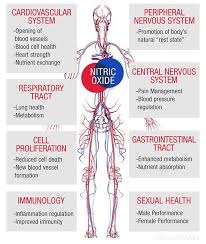Nose Breathing Improves Health and Performance by Increasing Nitric Oxide Levels
Use Your Nose to Relax, Be Healthier and Perform Better
In a recent blog, I discussed how diaphragmatic breathing helps to regulate the autonomic nervous system (ANS) that regulates all of our automatic functions, and our response to stress. In fact, emphasising certain phases of the breathing cycle (via the diaphragm) can dramatically increase the relaxation response.
Well, the story of the role of breathing in regulating or influencing the ANS goes even further, and the nose plays a major role as well as the diaphragm. This truly is a ‘wait, there’s more’ moment…
Relatively recently, a third subsystem of neurons that have been named ‘non-adrenergic and non-cholinergic’ neurons (because they use nitric oxide as a neurotransmitter) have been described and found to be integral in autonomic function, particularly in the gut and the lungs.
Nitric oxide has been found to act as a neurotransmitter, immune-regulator and vasodilator.
Some of the actions of nitric oxide include:
- Regulation of blood pressure.
- Boosting the immune system.
- Fighting microorganisms such as bacteria and viruses.
- Fighting cancer.
- Increasing blood supply to cells.
- Improving sleep quality.
- Increasing gut motility.
- Aiding in muscular control, balance and coordination.
- It has also been suggested to protect against cardiovascular disease, impotence, diabetic retinopathy, Alzheimer’s Disease and Parkinson’s Disease.
- Many athletes now use nitric oxide supplements to increase performance, as it increases endurance and strength.
A recent study comparing nitric oxide production in nose breathing and mouth breathing found that the nasal passages produced a significantly higher amount of nitric oxide than mouth breathing did. In fact, 50% of exhaled nitric oxide is produced in the nose. A further study found that nitric oxide is absorbed in the nose as well as being produced there.
Also, as exercise intensity increased, the levels of nitric oxide increased in nose breathing but not in mouth breathing. So, it can be implied that, when under high levels of stress, nose breathing will offer stress mediating effects via nitric oxide that can protect against the deleterious effects produced by long term stress, whereas mouth breathing will not.
To learn how to regulate your autonomic nervous system by nose and diaphragm breathing, for greater health, performance or relaxation, contact me by email or phone. I offer breathing dynamics taining one on one, via video Skype or in group courses.


